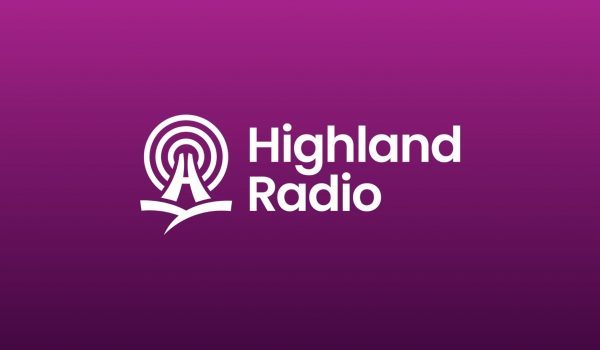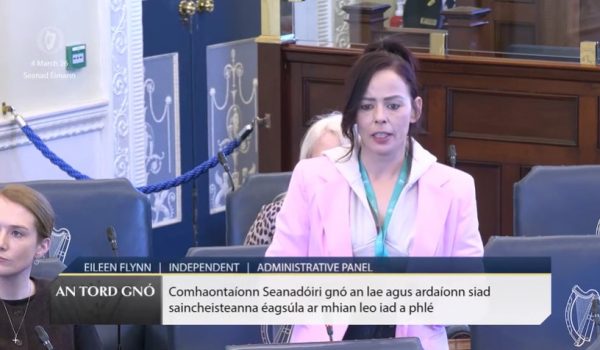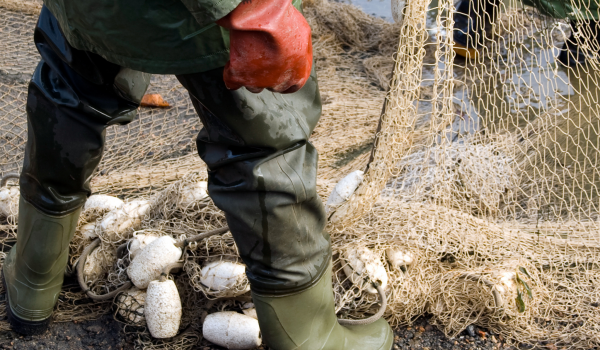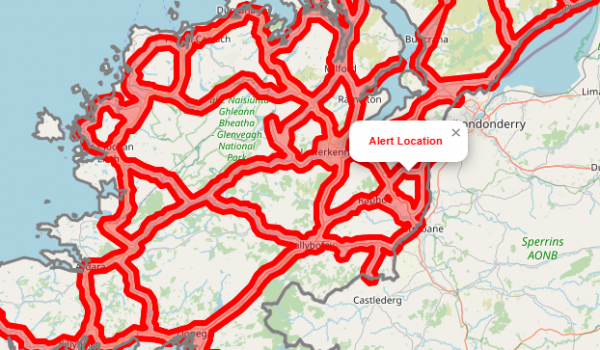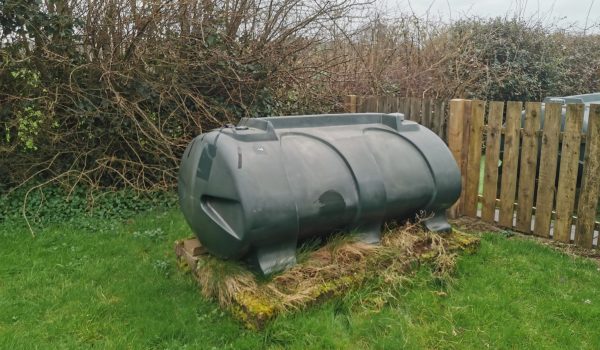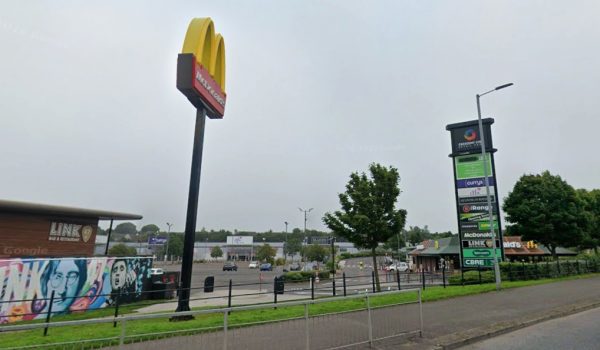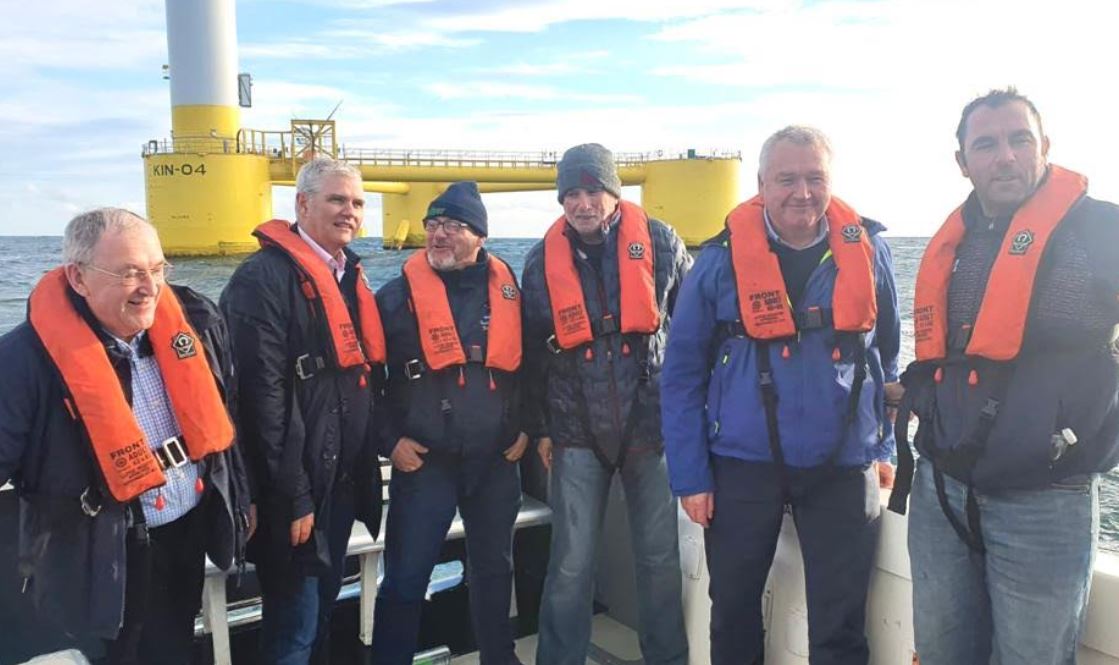
The Irish fishing industry says it has a right to be consulted about offshore wind farms because it affects the livelihoods of everyone.
That’s according to Aodh O Donnell, the Killybegs based Chief Executive of the Irish Fish Producers Association, who says says every industry needs to co-operate to reduce fossil fuels but co-operation works both ways and they are not being consulted.
Aodh O’Donnell says fishing interests are affected by both the location and operation of wind farms, but Minister Eamon Ryan is reported to have signed off on six Irish Sea developments which will move to planning stage. There is, he says, unease that this appears to be rushed.”
He says fishers and processors are of the view that no planning should proceed until the new Maritime Area Regulatory Authority is established.
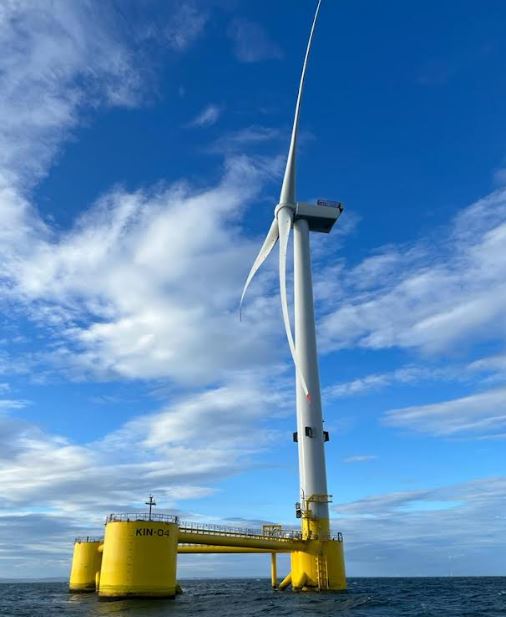
Mr O Donnell was one of six fisheries representatives to take part in a fact-finding mission to a Floating Offshore Wind Farm in Kincardine, Aberdeenshire. Sean O’Donoghue of the Killybegs Fishermen’s Organisation was also part of the group.
Mr O’Donnell says these ‘floating’ technologies open up options for the location of turbine in deeper offshore waters, but there must be meaningful consultation, and the correct pathway must involve the recognition of traditional pre-existing fishing rights.
Top picture – L to R are Sean O’Donoghue, Killybegs Fishermen’s Organisation (KFO); Aodh O Donnell, Irish Fish Producers Organisation (IFPO); Patrick Murphy, Irish South and West Producers Organisation (IS&WFPO); Seamus Breathnach, National Inshore Fishermen’s Association (NIFA); John Lynch, Irish South and East FPO (IS&EFPO); and Kevin O Donovan Irish South and East FPO on a fact-finding mission to the Floating Offshore Wind Farm in Kincardine,
***************************
Statement in full –
The Irish fishing industry say they have a right to be consulted about offshore wind farms because it affects their livelihoods. Spokesperson Aodh O Donnell says every industry needs to co-operate to reduce fossil fuels but “co-operation works both ways and we are not being consulted.”
“Fishing interests are affected by both the location and operation of wind farms,” says Aodh, who is chief executive of the Killybegs-based Irish Fish Producers Organisation (IFPO). “Available charts indicate that most of the rich Irish Sea fishing area is targeted for turbine development. Fishing vessels could be displaced if there is an untrammelled development of Offshore Wind Turbines. Our industry has already taken too many hits, but proper consultation could allow us all to co-exist.”
“However, Environment Minister, Eamon Ryan is reported to have signed off on six Irish Sea developments which will move to planning stage. There is unease that this appears to be rushed.”
“In addition, we are of the view that no planning should proceed until the new Maritime Area Regulatory Authority (MARA) is established. There are issues around marine interests and socio-economic or environmental impact assessments. But there are also huge questions about foreign ownership of Irish energy sources, which could affect future energy security.”
Mr O Donnell was one of six fisheries representatives to take part in a fact-finding mission to a Floating Offshore Wind Farm in Kincardine, Aberdeenshire. The delegation also included, John Lynch of the Irish South and East FPO, Patrick Murphy of the Irish South and West FPO, Sean O’Donoghue, Killybegs Fishermen’s Organisation, Irish South and East FPO representative Kevin O’Donovan from Cork and Seamus Breathnach, National Inshore Fishermen’s Association (NIFA).
This visit was a first step in appraising new Offshore Deep Water Floating Turbine technologies and was arranged by an Offshore Renewable Energy (ORE) developer, Simply Blue Group. This visit was arranged to showcase the high output floating wind turbines and the option to locate these units in deeper waters and without being fixed to the sea floor.
“The Aberdeen wind farm uses the current best in class ‘floating’ technology in this fast-moving area. This is an important consideration for Ireland as most of the planned developments are ‘fixed’ bottom arrangements that require shallower sea depths. Unfortunately, these targeted areas are also generally the most productive fishing and spawning grounds. These ‘floating’ technologies open up options for the location of turbine in deeper offshore waters. This will create less disruption to fishing activity and allow better co-existence with other marine interests too. Planning guidance in Ireland must steer developers towards less disruptive technologies.”
“Given the offshore competition for space, we have to work hard and collaboratively to defend our members interests. Many of our vessels are involved in long established fisheries for species such as Dublin Bay Prawns – a valuable resource traditionally fished in the Irish Sea. These vessels now face uncertainty due to the planned development of Offshore Wind Turbines.”
Aodh says a common compliant is the lack of adequate prior consultation. “Mutual respect must be given. For large wind farm developers, most of the first phase of applications for wind farms is in the rich Irish Sea fishing and spawning grounds. Unfortunately, international experience indicates that the colocation of Offshore Wind with trawl fisheries is not possible’’.
“At present we are experiencing a gold rush approach, as developers compete for space. We must work hard to defend our communities. We must avoid a lose-lose situation. The correct pathway must involve the recognition of traditional pre-existing fishing rights’’.
Mr O Donnell says there is a lot of sea available for development. “But a land grab of traditional productive fishing grounds is not acceptable. The Minister and Wind Farm industry need to take account of the rights of our fishers, who are often the last to be consulted.”
‘’Our members are already facing serious uncertainty and a spatial squeeze in the competition for Irish fishing grounds”, Aodh adds. “This is happening at a time when we are adapting to a serious loss of fishing opportunities already. Ireland contributed a 40% share of the total EU quotas given to the UK under Brexit. In addressing this reality, the sector must decommission 30% of our small whitefish fleet. Additionally, fishers will also have to face the prospect of 30% of Irish waters being classified as Marine Protected Areas by the end of the decade.”
“We understand the Government’s need to deliver on renewable energy commitments for 2030. Currently, our offshore energy generation in the Arklow Wind Farm is 25 Megawatts. The government target of 7 Gigawatts by 2030 increases this capacity to 280 times its current size. This must not result in an unacceptable social cost which will drive the demise of coastal fishing families.
Aodh O Donnell says we “all have a responsibility to be sensible. Adequate consultation with stakeholders is a prerequisite. We want to avoid making objections to planned development of the Wind Energy sector. But this development must be undertaken in areas with minimal adverse ecological and social impacts.”
“We acknowledge and appreciate the efforts Captain Brian FitzGerald and the Team at Simply Blue Group for arranging the visit. Deepwater floating turbines may form part of a solution. We have to steer a careful course to avoid being displaced losers in this push to take over our sustainably fished seas.”
